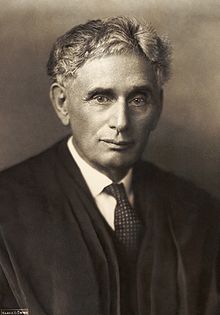
The New Brandeis or neo-Brandeis movement is an antitrust academic and political movement in the United States which argues that excessively centralized private power is dangerous for economical, political and social reasons.[1][2] Initially called hipster antitrust by its detractors, as also referred to as the "Columbia school" or "Neo-Progressive antitrust," the movement advocates that United States antitrust law return to a broader concern with private power and its negative effects on market competition, income inequality, consumer rights, unemployment, and wage growth.
The movement draws inspiration from the anti-monopolist work of Louis Brandeis, an early 20th century United States Supreme Court Justice who called high economic concentration “the Curse of Bigness” and believed monopolies were inherently harmful to the welfare of workers and business innovation.
The New Brandeis movement opposes the school of thought in modern antitrust law that antitrust should center on customer welfare (as generally advocated by the Chicago school of economics). Instead, the New Brandeis movement advocates a broader antimonopoly approach that is concerned with private power, the structure of the economy and market conditions necessary to promote competition.[3][4]
| Competition law |
|---|
 |
| Basic concepts |
| Anti-competitive practices |
|
| Enforcement authorities and organizations |
- ^ Wu, Timothy (2018). The Curse of Bigness: Antitrust in the New Gilded Age. New York: Columbia Global Reports. Archived from the original on 2022-06-18. Retrieved 2022-07-19.
- ^ "The New Brandeis Ideology (mid 2010s – Present): On the Dangers of Monopoly Power". Unbuilt Labs. 2021-01-06. Retrieved 2021-09-05.
- ^ Khan, Lina (2018-03-01). "The New Brandeis Movement: America's Antimonopoly Debate". Journal of European Competition Law & Practice. 9 (3): 131–132. doi:10.1093/jeclap/lpy020. ISSN 2041-7764.
- ^ "What Is 'Hipster Antitrust?'". Mercatus Center. 2018-10-18. Archived from the original on 2022-07-26. Retrieved 2022-01-02.
